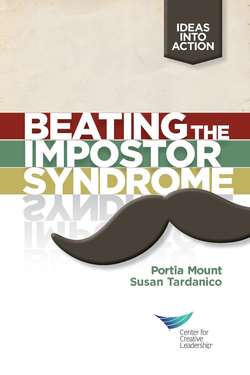Читать книгу Beating the Impostor Syndrome - Portia Mount - Страница 8
На сайте Литреса книга снята с продажи.
ОглавлениеAreYOUan IMPOSTOR?
Career experts and mental health professionals call it the “Impostor Syndrome.” Successful and intelligent leaders who have earned promotions, accolades, and recognition from their bosses, their peers, and their teams feel, deep down, like frauds. They worry that it’s only a matter of time before they are found out and their colleagues question their abilities.
Leaders who exhibit the Impostor Syndrome share many traits. They are typically ambitious, high-achieving individuals who believe they have not earned success. They frequently discount their own accomplishments. Negative stress, anxiety, and fear remind these leaders of their sense of inadequacy.
Does this sound like you or someone you know?
This book explains the developmental challenges that arise when “impostors” fail to recognize their abilities and are unable to internalize their accomplishments. After reading this book, you will learn how to recognize and manage the symptoms of the Impostor Syndrome to create a productive and fulfilling career.
War Games
Charlie, a retired US army colonel, served for seven years in key strategic leadership roles at the Pentagon. After hearing the authors speak about the Impostor Syndrome at a conference in Washington, DC, Charlie approached the dais full of emotion. “All these years, I had no idea what it was,” he said. “I thought I was broken. I used to sit behind a desk, wearing this decorated uniform, feeling like a scared, incompetent nine-year-old in a hero’s costume. For the life of me, I couldn’t understand why they kept promoting me.”
How IMPOSTOR SYNDROME Affects YOU
Leaders who exhibit the Impostor Syndrome have an intense fear of failure, a lack of confidence, and anxiety. These feelings often manifest as procrastination, risk aversion, and workaholism. Imagined impostors are also reluctant to ask questions for fear of appearing unintelligent. Such constraints negatively affect job performance and satisfaction for leaders at all levels, from individual contributors to members of an organization’s executive team.
Furthermore, negative and self-defeating thoughts can keep even the most highly respected leaders from developing their skills and talents. These missed career opportunities diminish contributions for those leaders, their teams, their organizations, and their communities.
The Impostor Syndrome can also lead to overwhelming negative stress, which plays out in a number of ways, such as sleeplessness and a weakened immune system. Additionally, the intense fear and stress experienced by imagined impostors create blurred work-life boundaries because those affected feel they must work 24/7 to keep their faux incompetence from being exposed. They believe there is no choice: work must take precedence over all else.
How IMPOSTOR SYNDROME Affects OTHERS
Let’s begin with an example of the impact of the Impostor Syndrome on the people you lead. Clare is the executive vice president of a large, successful company and has nine direct reports. In a recent culture survey conducted by the company, her direct reports described their working environment as “disempowering,” “demotivating,” and “lacking in trust.” These descriptors were so dramatically different from the results of other corporate functions that Clare’s organization brought in consultants to help Clare and her peers figure out what was going on.
